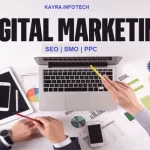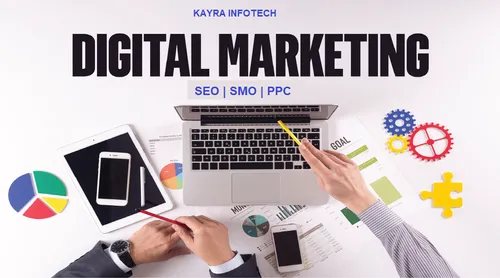Welcome to the world of digital marketing, where creativity meets technology and innovation fuels success! In this fast-paced era dominated by screens and smartphones, mastering the art of digital marketing has become a crucial skill for businesses to thrive and conquer new horizons. Whether you are a seasoned marketer looking to enhance your skills or an aspiring entrepreneur eager to make your mark online, this comprehensive guide is here to equip you with all the tools and strategies needed to navigate the ever-evolving digital landscape. Get ready to unleash your potential, captivate audiences, and catapult your brand towards unparalleled growth as we delve into the exciting realm of digital marketing mastery!
Definition of Digital Marketing
Digital marketing is the process of creating, managing, and executing a marketing plan that uses digital technologies to reach and engage customers. It includes the use of online channels such as search engines, social media, ecommerce platforms, and mobile apps. In contrast to traditional marketing methods such as print advertising and television commercials, digital marketing is interactive and often instantaneous.
Digital marketing strategies may include:
-Search engine optimization (SEO): Making sure your website appears high up in search engine results for relevant keywords.
-Google AdWords: Paying Google to place ads on websites based on keywords you specify.
-Facebook Advertising: Ads that appear on Facebook pages associated with your business or brand.
-LinkedIn Advertising: Ads that appear on LinkedIn profiles associated with your business or brand.
The Components of Digital Marketing
1. Understanding the Basics of Digital Marketing
Digital marketing is the process of creating, managing, and executing a marketing plan that uses digital channels such as online advertising, email marketing, and social media to reach and engage customers.
There are four essential components to any successful digital marketing campaign: Content, Strategy, Execution, and Measurement.
How to Use Digital Marketing Tools
Digital marketing is the use of digital technology to create, manage, and deliver a marketing message. It includes activities like creating a website or online presence, using online advertising, and managing e-mail lists.
There are many different digital marketing tools available, and it can be difficult to choose which ones to use. In this article, we will discuss some of the most common digital marketing tools and how you can use them to your advantage.
1. Website Builder: A website builder is a great tool if you want to create a simple website without any coding knowledge. There are numerous free and paid options available, and all of them will allow you to create a basic website in minutes. Once your website is created, you can add content, apply SEO (search engine optimization) techniques, and start attracting visitors from the internet search engines.
2. AdWords: AdWords is Google’s advertising platform. You can use AdWords to attract customers from the internet search engines or from other websites that are displaying ads on their pages. You can also target specific demographics (age range, location, etc.), which makes ads more effective. You will need to invest in an account with AdWords before you can start advertising your business online.
3. Social Media: Social media platforms like Facebook and Twitter are great ways to connect with potential customers and build relationships with them. You can post updates about your products or services, share useful information about your industry or niche area
Tips for Successful Online Marketing
1. Use a content calendar: Planning and executing a content strategy is one of the most important steps in online marketing. A well-executed content calendar will help you stay on top of current trends, write engaging and relevant copy, and track your performance over time.
2. Be consistent with your message: One of the most important aspects of successful online marketing is staying consistent with your core message. If you want potential customers to take action, it’s important that you communicate that message in all of your content and media platforms.
3. Create useful resources: Another key element to successful online marketing is creating valuable resources that can be used by others. This could include tutorials, whitepapers, or even blog posts that can help other marketers learn from your successes or failures.
4. Measure results regularly: Always measure the results of your online marketing efforts to ensure that you’re making the most efficient use of your time and resources. This will help you identify any areas where you need to make changes or improvements before moving forward.
Conclusion
In this comprehensive guide, we will teach you the fundamentals of digital marketing so that you can start creating successful campaigns. We will cover topics such as search engine optimization, internet advertising, and social media marketing, providing you with the knowledge you need to take your business to the next level. With our help, your business can finally break through the competition and achieve success on a global scale. Thanks for reading!


























